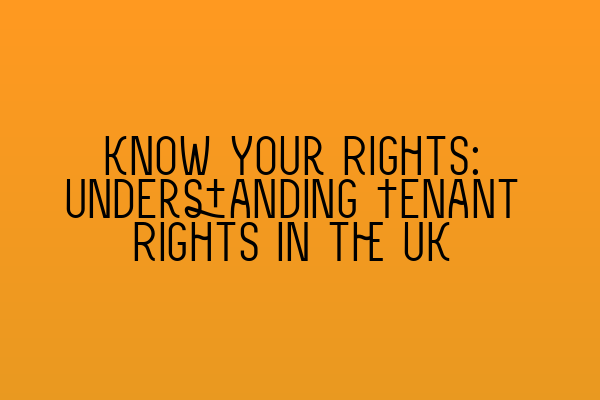As a tenant in the UK, it is crucial to understand your rights to ensure that you are protected and treated fairly. Whether you are renting a house, flat, or commercial space, knowing your rights can help you navigate any legal issues that may arise during your tenancy. In this article, we will explore the key tenant rights in the UK and provide you with essential information to protect your interests.
1. Right to a Written Agreement
When entering into a tenancy agreement, it is important to have a written contract that clearly states the terms and conditions of your tenancy. This agreement should include details such as the duration of the tenancy, rent amount, deposit amount, and any other relevant terms.
For a comprehensive guide on legal challenges in property transactions, you can refer to the article “Legal challenges in property transactions: A comprehensive guide“.
2. Right to a Safe and Habitable Property
As a tenant, you have the right to live in a property that is safe, in good repair, and fit for habitation. Your landlord is responsible for maintaining the property and ensuring that it meets the required health and safety standards. If you encounter any issues with the property, such as dampness or faulty electrical wiring, it is essential to notify your landlord promptly.
3. Right to Privacy
Your landlord should respect your privacy and seek your permission before entering the property. Unless it is an emergency situation, your landlord must provide you with at least 24 hours’ notice. Additionally, they should not excessively interfere with your peaceful enjoyment of the property. It is important to remember that your landlord cannot simply enter the property without a valid reason.
4. Right not to Face Unfair Eviction
Eviction can be a distressing experience, and as a tenant, you have rights to protect you from unfair evictions. Your landlord must follow the proper legal procedures, such as serving you with a valid notice and obtaining a court order, before evicting you. It is important to understand the different types of eviction notices, including Section 21 and Section 8 notices, and seek legal advice if you believe you are facing an unfair eviction.
5. Right to Challenge Rent Increases
If your landlord intends to increase your rent, they must follow specific procedures and provide you with proper notice. Depending on the type of tenancy agreement, your right to challenge the rent increase may vary. For instance, if you have an assured shorthold tenancy, your landlord can only increase the rent once every 12 months. However, if you believe that the proposed rent increase is unreasonable, you may have the right to challenge it through a rent assessment committee or tribunal.
For information on updates in UK property laws and their key changes, you can refer to the article “Updates in UK Property Laws: Key Changes and Implications“.
6. Right to the Return of Your Deposit
If you have paid a deposit, your landlord is required to protect it in a government-approved tenancy deposit scheme. At the end of your tenancy, your landlord must return your deposit within a specified time frame, provided there are no deductions for damage or unpaid rent. If your landlord fails to return your deposit or makes unjustified deductions, you can seek legal action.
7. Right to Challenge Unfair Terms and Conditions
It is important to review your tenancy agreement thoroughly to ensure that it does not contain any unfair terms or conditions that could disadvantage you as a tenant. Unfair terms, such as those that disproportionately favor the landlord or limit your rights, may be unenforceable. If you are unsure about any clauses in your tenancy agreement, seek legal advice to understand your rights and obligations.
To navigate lease laws in the UK and gain essential guidelines for tenants and landlords, you can refer to the article “Navigating Lease Laws in the UK: Essential Guidelines for Tenants and Landlords“.
8. Right to Redress
If you encounter any problems with your tenancy, such as unresolved maintenance issues or harassment from your landlord, you have the right to seek redress. There are various avenues available for redress, including reporting the issue to your local council or seeking legal advice from a solicitor specializing in property law.
Conclusion
Being aware of your tenant rights in the UK is crucial for a positive and fair tenancy experience. By understanding your rights, you can protect yourself from potential issues and ensure that you are treated fairly by your landlord. Whether it is your right to a safe and habitable property, protection against unfair evictions, or the right to challenge rent increases, knowing your rights empowers you as a tenant.
For more information on how to dominate property law questions and avoid common pitfalls, you can refer to the article “Dominate Property Law Questions: Avoiding Common Pitfalls“.
If you’re studying land law and need tips to ace your exam preparation, you can find useful guidance in the article “Land Law Revision Tips: Ace Your Exam Preparation“.
